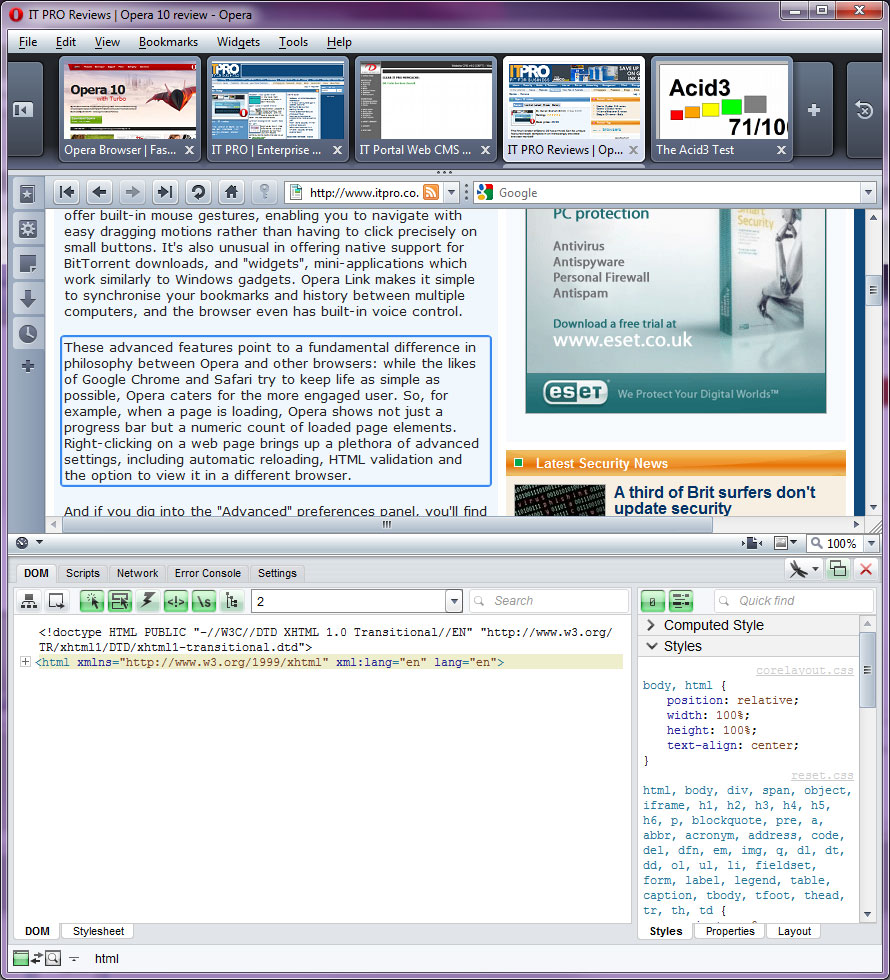Opera 10 review
The final version of Opera 10 has arrived. Can its unique features help it compete in an increasingly crowded browser market?

Opera brings itself up to date with the rest of the pack with a solid browser release offering a good mix of unique features and reasonable performance. However, its main appeal is likely to be to advanced users who have the desire for more technical detail and access to that left-of-field feature set. For everyone else, the more mainstream browsers will do fine.

These advanced features point to a fundamental difference in philosophy between Opera and other browsers: while the likes of Google Chrome and Safari try to keep life as simple as possible, Opera caters for the more engaged user. So, for example, when a page is loading, Opera shows not just a progress bar but a numeric count of loaded page elements. Right-clicking on a web page brings up a plethora of advanced settings, including automatic reloading, HTML validation and the option to view it in a different browser.
And if you dig into the "Advanced" preferences panel, you'll find all sorts of options for customising tab behaviour, notifications and security settings the sort of options that Firefox hides away in its inscrutable "about:config" panel, if indeed it offers them at all.

Best of all is Opera's handling of stored credentials. Like most browsers, when you log in to a secure site, it will offer to learn your user name and password; but it also learns how to submit them, so next time you visit that page it takes just a single clock on Opera's "log on" button to enter the site.
With so much on offer, you may be wondering why Opera hasn't been more successful. Partly it's down to a lack of user awareness: Opera Software is a small Norwegian company that simply doesn't grab mainstream attention in the way Google or Apple can.
Get the ITPro daily newsletter
Sign up today and you will receive a free copy of our Future Focus 2025 report - the leading guidance on AI, cybersecurity and other IT challenges as per 700+ senior executives
Darien began his IT career in the 1990s as a systems engineer, later becoming an IT project manager. His formative experiences included upgrading a major multinational from token-ring networking to Ethernet, and migrating a travelling sales force from Windows 3.1 to Windows 95.
He subsequently spent some years acting as a one-man IT department for a small publishing company, before moving into journalism himself. He is now a regular contributor to IT Pro, specialising in networking and security, and serves as associate editor of PC Pro magazine with particular responsibility for business reviews and features.
You can email Darien at darien@pcpro.co.uk, or follow him on Twitter at @dariengs.
-
 Westcon-Comstor and Vectra AI launch brace of new channel initiatives
Westcon-Comstor and Vectra AI launch brace of new channel initiativesNews Westcon-Comstor and Vectra AI have announced the launch of two new channel growth initiatives focused on the managed security service provider (MSSP) space and AWS Marketplace.
By Daniel Todd Published
-
 Third time lucky? Microsoft finally begins roll-out of controversial Recall feature
Third time lucky? Microsoft finally begins roll-out of controversial Recall featureNews The Windows Recall feature has been plagued by setbacks and backlash from security professionals
By Emma Woollacott Published
-
 The UK government wants quantum technology out of the lab and in the hands of enterprises
The UK government wants quantum technology out of the lab and in the hands of enterprisesNews The UK government has unveiled plans to invest £121 million in quantum computing projects in an effort to drive real-world applications and adoption rates.
By Emma Woollacott Published